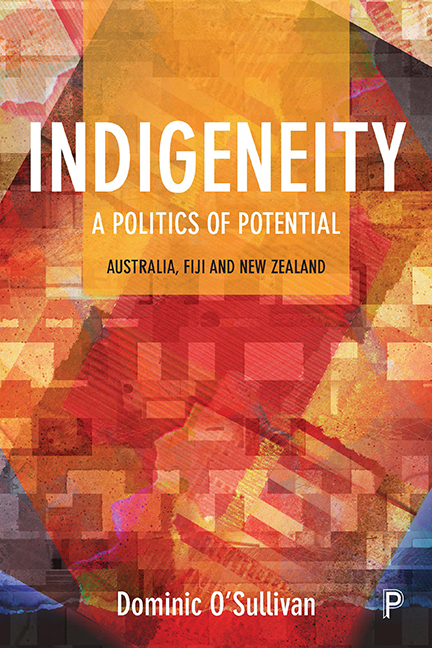Book contents
- Frontmatter
- Dedication
- Contents
- Acknowledgements
- Introduction
- one Reconciliation
- two The politics of indigeneity
- three Liberal democracy and differentiated citizenship
- four Liberal democratic inclusion
- five Indigeneity and contemporary globalisation
- six Economic development as differentiated citizenship: Australia
- seven Economic development as differentiated citizenship: New Zealand
- eight Economic development as differentiated citizenship: Fiji
- Conclusion
- References
- Index
two - The politics of indigeneity
Published online by Cambridge University Press: 05 April 2022
- Frontmatter
- Dedication
- Contents
- Acknowledgements
- Introduction
- one Reconciliation
- two The politics of indigeneity
- three Liberal democracy and differentiated citizenship
- four Liberal democratic inclusion
- five Indigeneity and contemporary globalisation
- six Economic development as differentiated citizenship: Australia
- seven Economic development as differentiated citizenship: New Zealand
- eight Economic development as differentiated citizenship: Fiji
- Conclusion
- References
- Index
Summary
Introduction
Indigeneity is a developing theory of justice and political strategy used by indigenous peoples to craft their own terms of belonging to the nation state as ‘first peoples’ (Ivison et al., 2000; Maaka and Fleras, 2005; O’Sullivan, 2005; Shaw, 2008; Tully, 1999). It claims extant political rights to challenge traditional assumptions of state power and authority. Its aim is to create political space for substantive and sustainable reconciliation through self-determination and a particular indigenous share in the sovereign authority of the modern state itself (Maaka and Fleras, 2005; O’Sullivan, 2007; Shaw, 2008). A foundational assumption is that, if culture is preliminary to individual liberty, it must necessarily concern normative liberal theory, as ‘fairness demands more than [Rawlsian] “neutrality”’ (Scott, 2003, p. 93). While liberalism is not always associated with protecting indigenous people's culturally framed liberty against the state, it does enjoy that potential. Indigenous rights are necessarily framed as group rights, which provide context and meaning to individual liberty; which does not always and necessarily set group rights aside. The politics of indigeneity is a discourse of both resistance and transformation presenting ‘a fundamental challenge to the prevailing social and political order’. It requires that colonial ideas about political arrangement, authority and power make way for political spaces of indigenous autonomy (Fleras, 2000, p. 200). Its effectiveness requires some juxtaposing of traditional notions of independent authority with western political theory, to craft new bases for political engagement. In this way political theory may contribute to the possibilities for working out principled relationships for living together differently in the one national jurisdiction.
The politics of indigeneity responds to the proposition that while liberal citizenship might tend towards homogeneity in public life it is also reasonable for ‘cultural pluralists [to] demand a degree of differentiation not present in almost any developed democracy’ (Fleras, 2000, p. 373). The chapter explores the bases on which one might find a shared framework for working out the kinds of recognition that are fair and reasonable for meeting the principal test of liberal acceptability, which is, whether or not group rights ‘undermine the integrative function of citizenship’ (Fleras, 2000, p. 373).
- Type
- Chapter
- Information
- Indigeneity: A Politics of PotentialAustralia, Fiji and New Zealand, pp. 35 - 50Publisher: Bristol University PressPrint publication year: 2017



